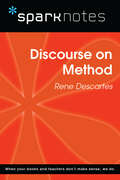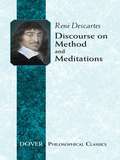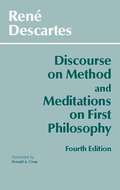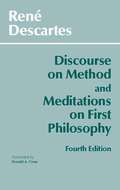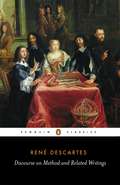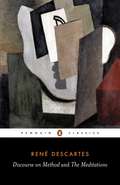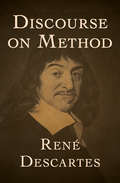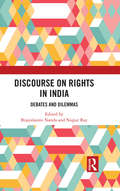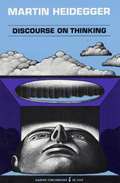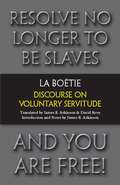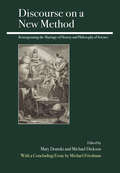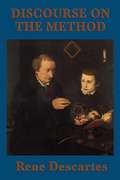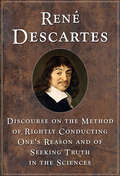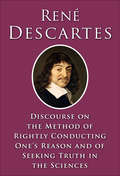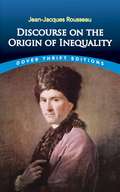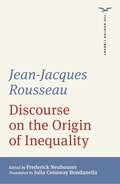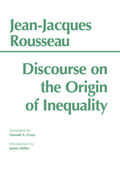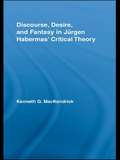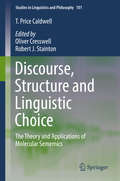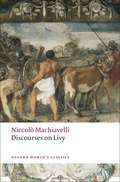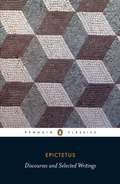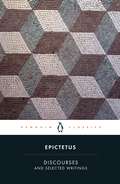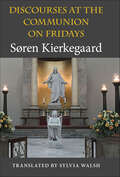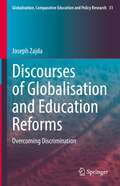- Table View
- List View
Discourse on Method (SparkNotes Philosophy Guide)
by SparkNotesDiscourse on Method (SparkNotes Philosophy Guide) Making the reading experience fun! SparkNotes Philosophy Guides are one-stop guides to the great works of philosophy–masterpieces that stand at the foundations of Western thought. Inside each Philosophy Guide you&’ll find insightful overviews of great philosophical works of the Western world.
Discourse on Method and Meditations (Dover Philosophical Classics)
by René Descartes Elizabeth S. Haldane G. R. RossIs it possible to be certain of anything? If so, how? The father of modern philosophy and the founder of rational method in philosophical thought, René Descartes (1596-1650) sought the answers to these questions and in doing so, addressed the most important of methods of thinking and understanding truth. In Discourse on Method, he applies a scientific approach to philosophy that comprises four principles: to accept only what reason recognizes as "clear and distinct"; to analyze complex ideas by dividing them into smaller elements; to reconstruct the ideas; and to make accurate and complete enumerations of the data. His Meditations proceed according to this method, exploring the mind/body distinction, the nature of truth and error, the existence of God, and the essence of material things.
Discourse on Method and Meditations on First Philosophy (4th Edition)
by René Descartes Donald A. CressThis new edition contains Donald Cress' completely revised translation of the Meditations (from the corrected Latin edition) and recent corrections to Discourse on Method, bringing this version even closer to Descartes' original....
Discourse on Method and Meditations on First Philosophy (Hackett Classics)
by René DescartesThis edition contains Donald Cress's completely revised translation of the Meditations (from the corrected Latin edition) and recent corrections to Discourse on Method, bringing this version even closer to Descartes's original, while maintaining the clear and accessible style of a classic teaching edition.
Discourse on Method and Related Writings
by René DescartesThis is the second of a new two-volume edition of the works of Descartes in Penguin Classics. This volume is designed for students who approach Descartes from the point of view of his philosophy of science. Includes DISCOURSE ON METHOD, the most accessible and well-known of his discussions of scientific method; the first seven chapters of the earlier, unpublished work, THE WORLD; as well as a selection of Descartes' correspondence and his replies to his critics.
Discourse on Method and the Meditations: And Meditations On The First Philosophy (Barnes And Noble Library Of Essential Reading Ser.)
by René DescartesRené Descartes was a central figure in the scientific revolution of the seventeenth century. In his Discourse on Method he outlined the contrast between mathematics and experimental sciences, and the extent to which each one can achieve certainty. Drawing on his own work in geometry, optics, astronomy and physiology, Descartes developed the hypothetical method that characterizes modern science, and this soon came to replace the traditional techniques derived from Aristotle. Many of Descartes' most radical ideas - such as the disparity between our perceptions and the realities that cause them - have been highly influential in the development of modern philosophy.
Discourse on Method: Large Print
by René DescartesDescartes&’s revolutionary treatise on reason and scientific thought, which sparked radical breakthroughs in mathematics, philosophy, and metaphysics After he finished school, René Descartes was left with more doubts than certainties. His Jesuit education included some of the best teaching available in mathematics, physics, and letters, and yet Descartes found the foundations of his schooling hollow. Determined to discover for himself what was real, he spent the next nine years traveling through Europe, interacting with locals of all walks of life, including nobles, soldiers, and laborers, in search of the breadth of experience that would later inspire his greatest work: Discourse on Method. When it was first published, the book offered a remarkable new approach to gaining knowledge based on reason and skepticism, the steps for which Descartes lays out sequentially, from the deconstruction of all previously held beliefs to the slow and methodical rebuilding of fact anchored in the first and most innate truth: I think, therefore I am. This ebook has been professionally proofread to ensure accuracy and readability on all devices.
Discourse on Rights in India: Debates and Dilemmas
by Bijayalaxmi Nanda Nupur RayThis book is a compelling examination of the theoretical discourse on rights and its relationship with ideas, institutions and practices in the Indian context. By engaging with the crucial categories of class, caste, gender, region and religion, it draws attention to the contradictions and contestations in the arena of rights and entitlements. The essays by eminent experts provide deep and nuanced insights on the intersecting issues and concerns of individual and group identities as well as their connection with the State along with its multifarious institutions and practices. The volume not only engages with the dilemmas emerging out of the rights discourse, but also sets out to recognize the significance of a shared commitment to a rights-based framework towards the promotion of justice and democracy in society. The book will be useful to academics, social scientists, researchers and policymakers. It will be of special interest to teachers and students in the fields of politics, development studies, philosophy, ethics, sociology, gender/women’s studies and social movements.
Discourse on Thinking
by Martin HeideggerDiscourse on Thinking questions that must occur to us the moment we manage to see a familiar situation in unfamiliar light.
Discourse on Voluntary Servitude
by James B. Atkinson David Sices Etienne de La BoetieAn elegant English version of La Boetie's Discourse on Voluntary Servitude, which is both a key to understanding much of Montaigne and a major piece of early modern political thought. --Timothy Hampton, Professor of French and Comparative Literature, University of California, Berkeley
Discourse on a New Method
by Michael Dickson Mary DomskiAddressing a wide range of topics, from Newton to Post-Kuhnian philosophy of science, these essays critically examine themes that have been central to the influential work of philosopher Michael Friedman. Special focus is given to Friedman's revealing study of both history of science and philosophy in his work on Kant, Newton, Einstein, and other major figures. This interaction of history and philosophy is the subject of the editors' "manifesto" and serves to both explain and promote the essential ties between two disciplines usually regarded as unrelated.
Discourse on the Method
by Rene DescartesDiscourse on the Method of Rightly Conducting One's Reason and of Seeking Truth in the Sciences is presented here in a high quality paperback edition. This popular classic work by Rene Descartes is in the English language, and may not include graphics or images from the original edition. If you enjoy the works of Rene Descartes then we highly recommend this publication for your book collection.
Discourse on the Method of Rightly Conducting One's Reason and of Seeking Truth in the Sciences
by René DescartesThe Discourse on the Method is a philosophical and autobiographical treatise published by René Descartes in 1637. Its full name is Discourse on the Method of Rightly Conducting One's Reason and of Seeking Truth in the Sciences.
Discourse on the Method of Rightly Conducting One's Reason and of Seeking Truth in the Sciences
by René DescartesIn this work, René Descartes (1596-1650) outlines his "Method," which attempts to apply mathematical reasoning to all fields of inquiry. Starting with universal doubt, Descartes passes via his celebrated "I think, therefore I am," to the certainty of the existence of God.
Discourse on the Method of Rightly Conducting One's Reason and of Seeking Truth in the Sciences
by René DescartesIn this work,René Descartes (1596-1650) outlines his "Method," which attempts to apply mathematical reasoning to all fields of inquiry. Starting with universal doubt, Descartes passes via his celebrated "I think, therefore I am," to the certainty of the existence of God.
Discourse on the Origin of Inequality (Dover Thrift Editions Ser.)
by Jean-Jacques RousseauA strikingly original inquiry into politics and human nature, the Discourse presents a theoretical view of people in a pre-social condition and the ensuing effects of civilization. In his sweeping account of social and political development, the author develops a theory of evolution that prefigures Darwinism and encompasses aspects of ethics, sociology, and epistemology. One of the most influential works of the Enlightenment, the Discourse on the Origin of Inequality offers both a thought-provoking account of society's origins and a keen criticism of unequal political institutions.
Discourse on the Origin of Inequality (The Norton Library #0)
by Jean Jacques RousseauAbout Discourse on the Origin of Inequality The Norton Library edition of Rousseau’s Discourse features an inviting and readable translation by Julia Conaway Bondanella that makes the text accessible to the modern English reader while faithfully preserving the power and clarity of Rousseau’s voice and style of argumentation. A thorough introduction by Frederick Neuhouser—"one of the most brilliant philosophical readers of Rousseau that we have” (Christopher Brooke)—provides historical and intellectual context for the Discourse and its major arguments. Annotations throughout the text clarify obscure or ambiguous terms and references.
Discourse on the Origin of Inequality: Discourse On The Sciences And The Arts, Discourse On The Origin Of Inequality, Discourse On Political Economy, On The Social Contract, The State Of War (Hackett Classics)
by Jean-Jacques RousseauDonald Cress's highly regarded translation, based on the critical Pléiade edition of 1964, is here issued with a lively introduction by James Miller, who brings into sharp focus the cultural and intellectual milieu in which Rousseau operated. This new edition includes a select bibliography, a note on the text, a translator’s note, and Rousseau’s own Notes on the Discourse.
Discourse, Desire, and Fantasy in Jurgen Habermas' Critical Theory
by Kenneth MacKendrickThis book argues that Jürgen Habermas’ critical theory can be productively developed by incorporating a wider understanding of fantasy and imagination as part of its conception of communicative rationality and communicative pathologies. Given that meaning is generated both linguistically and performatively, MacKendrick argues that desire and fantasy must be taken into consideration as constitutive aspects of intersubjective relations. His aim is to show that Habermasian social theory might plausibly renew its increasingly severed ties with the early critical theory of the Frankfurt School by taking account of these features of practice life, thus simultaneously rekindling the relevance of the nearly forgotten emancipatory intent in his earlier work and rejuvenating an emphasis on the contemporary critique of reason. This innovative new study will be of interest to those focusing on the early writings of Habermas, the writings of the Frankfurt School, and the relation between critical theory, hermeneutics, and psychoanalysis.
Discourse, Structure and Linguistic Choice: The Theory and Applications of Molecular Sememics (Studies in Linguistics and Philosophy #101)
by Robert J. Stainton T. Price Caldwell Oliver CresswellThis volume presents eight papers and a draft monograph by T. Price Caldwell on topics in linguistics, semiotics and philosophy of language. From the beginning of his professional career onwards, Caldwell wrote short fiction and poetry, and he taught English literature. The relevance to these of philosophy of language, semiotics and certain areas of linguistics increasingly caught his interest. This book presents the fruits of this later work. Of the papers included here, two are abstract and theoretical, focusing on linguistic methodology and Caldwell’s overarching views on the nature of meaning-in-context. His position here, which he called Molecular Sememics, echoes early Structuralism and Functionalism, but addresses shortfalls in each. Two other papers apply the method and theory to topics within semantics and pragmatics, including especially the structuring of discourse. The remaining four papers connect Caldwell’s theoretical insights to his life-long interests in fiction and pedagogy. The monograph – which Caldwell was left unfinished due to illness – aims to present as a single intellectual package the theory and the applications.
Discourses On Livy (Oxford World's Classics)
by Niccolo MachiavelliThis book is as essential to an understanding of Machiavelli as his famous treatise, The Prince. Equally controversial, it reveals his fundamental preference for a republican state. This book is providing the contemporary reader with sufficient historical, linguistic, and political information to understand and interpret the revolutionary affirmations Machiavelli made, based on the historical evidence he found in Livy.
Discourses and Selected Writings
by Epictetus Robert Dobbin'I must die. But must I die bawling? 'Epictetus, a Greek stoic and freed slave, ran a thriving philosophy school in Nicropolis in the early second century AD. His animated discussions were celebrated for their rhetorical wizardry and were written down by Arrian, his most famous pupil. Together with the Enchiridion, a manual of his main ideas, and the fragments collected here, The Discourses argue that happiness lies in learning to perceive exactly what is in our power to change and what is not, and in embracing our fate to live in harmony with god and nature. In this personal, practical guide to the ethics of Stoicism and moral self-improvement, Epictetus tackles questions of freedom and imprisonment, illness and fear, family, friendship and love, and leaves an intriguing document of daily life in the classical world. In the introduction that accompanies this lively new translation, Robert Dobbin discusses Epitetus' life, his place in the Stoic tradition, his influence on world philosophies and his relevance in the modern day. This edition also includes a bibliography, notes and a glossary of names.
Discourses and Selected Writings
by EpictetusContains The Discourses/Fragments/Enchiridion'I must die. But must I die bawling?'Epictetus, a Greek Stoic and freed slave, ran a thriving philosophy school in Nicopolis in the early second century AD. His animated discussions were celebrated for their rhetorical wizardry and were written down by Arrian, his most famous pupil. The Discourses argue that happiness lies in learning to perceive exactly what is in our power to change and what is not, and in embracing our fate to live in harmony with god and nature. In this personal, practical guide to the ethics of Stoicism and moral self-improvement, Epictetus tackles questions of freedom and imprisonment, illness and fear, family, friendship and love.Translated and Edited with an Introduction by Robert Dobbin
Discourses at the Communion on Fridays (Philosophy of Religion)
by Søren KierkegaardSøren Kierkegaard's 13 communion discourses constitute a distinct genre among the various forms of religious writing composed by Kierkegaard. Originally published at different times and places, Kierkegaard himself believed that these discourses served as a unifying element in his work and were crucial for understanding his religious thought and philosophy as a whole. Written in an intensely personal liturgical context, the communion discourses prepare the reader for participation in this rite by emphasizing the appropriate posture for forgiveness of sins and confession.
Discourses of Globalisation and Education Reforms: Overcoming Discrimination (Globalisation, Comparative Education and Policy Research #31)
by Joseph ZajdaThis book focuses on discourses of effective learning environments globally for reducing discrimination in schools. It offers innovative ideas concerning the future directions that education and policy reforms could take, in order to promote equality, social justice, and access to quality of education for all.The chapters offer a timely analysis of current issues affecting schooling and strategies for creating effective learning environments globally for overcoming discriminations in schools. It is argued that that one of the most significant variables in creating effective learning environments for reducing classroom discrimination is the student’s cultural identity, the self-concept and self-esteem. The next variables influencing students’ learning environment are motivational strategies, self-regulated learning, and students’ active engagement in constructivist learning. This book contributes in a very scholarly way, to a more holistic understanding of the nexus between globalisation, comparative education research and education reforms for reducing discrimination. It will be beneficial for a broad spectrum of users, including policy-makers, academics, graduate students, education policy researchers, administrators, and practitioners.
